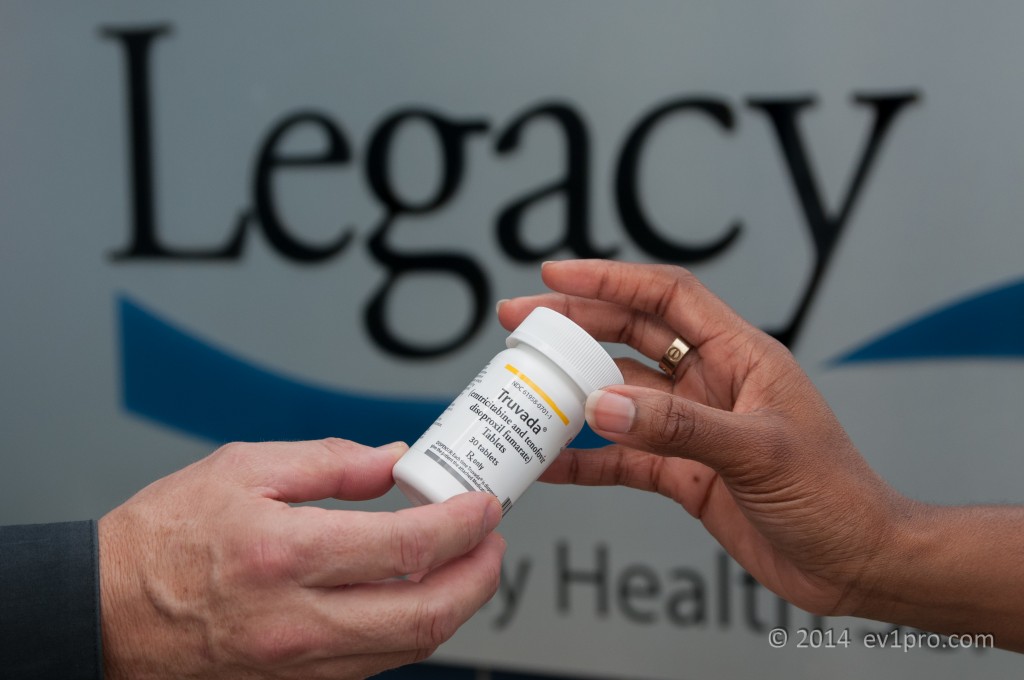A Legacy of Health: Montrose Clinic at the Vanguard of HIV Prevention with Controversial Drug Regimen

Every day at 6:30 a.m., a 39-year-old IT specialist in Montrose commences his routine. He shaves, showers, then, a half hour in, shakes a blue oval pill onto his palm and downs it with his coffee. The pill is called Truvada, and for a healthy gay man such as Jay (a pseudonym) it will cut his chance of contracting HIV by more than 90 percent.
After the 30 years of devastation HIV has dealt gay men, you might think Truvada would be cause for celebration. Instead, it has prompted intense controversy. Though the U.S. government approved the pill for preventive use more than two years ago, its adoption has been slow and sparse. Many have championed the drug. Others, though, question Truvada’s effectiveness, its safety, and above all, whether prescribing it threatens the 30-year-old gold standard of HIV prevention: faithful use of condoms.
Montrose’s Legacy Community Health Services is among the public health institutions in the vanguard of Truvada supporters. Founded by two gay doctors at the peak of the AIDS epidemic in 1981, Legacy has today expanded into a Houston, Baytown, and Beaumont health network that serves men, women, and children. But Legacy hasn’t forgotten its roots or mission as a leader in the war on HIV. Truvada, Legacy public health experts say, needs to be part of that fight.
”Truvada is another tool,” says Amy Leonard, Legacy’s senior public health director. The clinic has prescribed the pill for about 45 men, starting in January 2013, and, Leonard says, “We’re hoping to see a lot more people consider it.”
Despite the controversy, in some ways Truvada isn’t really new. The pill combines two drugs designed for people already infected with HIV, drugs used effectively throughout the developing world for some seven years. A recent study showed greater than 90 percent effectiveness in preventing infection in gay and bisexual men and transgender women if Truvada was taken consistently. In 2012, a daily dose of Truvada – called PrEP, short for pre-exposure prophylaxis – was approved by the U.S. Food and Drug Administration for use in preventing HIV infection.
Since then, public health experts have grown more and more enthusiastic about PrEP’s potential. In May, for the first time, the U.S. Department of Health and Human Services included PrEP in its guidelines for preventing HIV in healthy people. On July 11, the World Health Organization weighed in with the recommendation that all HIV-negative gay men use preventive drugs such as Truvada along with condoms.
Currently, only about 10,000 people nationwide have prescriptions for Truvada. But the public health implications of the PrEP regimen are vast. According to the Centers for Disease Control, at the very least a half million Americans could qualify for PrEP. Among them: men who have sex with men who are at high-risk, heterosexual men and women whose partners are high risk, men or women with an HIV positive sex partner, and intravenous drug users. Of these at-risk groups, gay men are by far the largest population who could benefit.
And the need for a new HIV strategy for them is urgent. Thirty years after AIDS began to devastate gay communities on the east and west coasts, the epidemic now burns hottest in the South. Texas ranks fourth in the number of AIDS deaths nationwide; in Harris County, HIV diagnoses increase four percent between 2011 and 2012.
Poverty and lack of access to health care and education are the major culprits in this trend. But another major factor plays a role: decreased condom use. For decades, gay activists have exhorted members of their community to use condoms religiously, and those efforts, and the sense of responsibility they inspired, helped contain HIV.
Over the past decade, though, the number of gay men who reported having had unprotected sex increased almost 20 percent. In part, HIV experts say, this reflects improved treatment for the disease. Successful AIDS management treatments have spread a sense of complacency. But human nature also plays a role. Gay or straight, research shows, few people use condoms consistently over long periods of time.

Even so, many doctors first balked at giving PrEP. They worried about possible side effects, and whether their healthy patients would be as lax about taking Truvada as others are about contraception or insulin use. “It’s a commitment,” says Leonard, Legacy’s public health director. “It’s a bigger commitment than birth control.”
If people are prescribed the pill, but don’t take it as they should, they could have a false sense of security, Leonard notes. They might act as if they are protected when they’re not.
And there are those side effects: possible weight loss, stomach pain, headaches, even rare cases of kidney or liver damage. Nevertheless, public health officials have long considered the two drugs that make up PrEP safe enough to prescribe as part of a regimen for treating millions of HIV-infected patients worldwide.
Finally, there is the question of Truvada’s cost. While insurance now covers much of the expense, Truvada can cost up to $15,000 a year out of pocket. Even with a discount offered by Legacy, thanks to a federal provision known as 340B pricing, Truvada can still be about $500 a month. In addition, PrEP users need to go for quarterly checkups – a potential hardship for workers who can’t easily take time off. For the moment, that limits long-term PrEP use to upper middle class patients and above.
But PrEP’s remarkable success rate has won over specialists. “You’ve got to be careful not to let the perfect be the enemy of the good,” says Anthony Fauci, director of the National Institute of Allergies and Infectious Diseases in Maryland, and a world authority on HIV.
Used properly, Fauci says, PrEP is highly effective. “It is not supposed to be a substitute for a condom. But suppose a woman is in a relationship with someone infected, or who refuses to use a condom?” he asks. In such a case, PrEP would allow the HIV negative partner to protect herself. The AIDS medical community, Fauci says, has learned over the years that treatment needs to be tailored to real-life human experience.
Now the biggest obstacle to PrEP lies within the gay community itself. In a group so scarred by AIDS, gay activists say, any change to the condoms-only strategy can seem suicidal. Stigma is another obstacle, according to Legacy public affairs director Januari Leo. “We liken it to birth control: any time you tie a medication to sex, there is going to be a stigma,” she says. “In the gay community, there’s a term ‘Truvada whore.’ The connotation is that you are sexually active with multiple partners.”
But to a growing number of gay men, the regimen is empowering.
“PrEP is a change in our culture – a change in our way of life,” says Jay, the Montrose computer specialist. Single and HIV-negative, Jay goes out of his way to mention his PrEP regimen on his social media pages. He wants his friends to consider taking advantage of it too.
Jay began his own regimen nine months ago, after a close friend was turned down for PrEP by his doctor. The physician, not an AIDS specialist, didn’t think the young man fit the profile of a high-risk candidate. The young man, too self-conscious to detail why he might in fact need the pill, didn’t push the issue. Three months later, Jay’s friend tested HIV-positive.
For Jay, the episode exposed the danger of denying one’s human nature. “Some people say, just put a condom on. I find that’s not always what happens,” he says. “I am single, not necessarily what would be called extremely promiscuous. Why would I not want to take control of my health? I make the decision to do that when I clear-headed, every day, at 7 a.m.”

[…] The candlelight vigil is one element of that. Others include an emphasis on Legacy’s ongoing practice of free testing for HIV, red ribbon commemorative building lights from Saturday November 29 through Monday December 1, a Montrose Center showing of The Normal Heart, the movie version of Larry Kramer’s famous play about the early days of the AIDS crisis, and an educational push about Pre-exposure Prophylaxis or PrEP, a relatively new HIV prevention regimen for people who are HIV-negative. (For more on PrEP, see this earlier MMD story.) […]
[…] story references an earlier Montrose District article about a pharmaceutical regimen, which has been approved by the CDC as a pre-exposure prophylaxis […]
[…] This community health center has been a cornerstone of Montrose, providing comprehensive care and specialized HIV/AIDS treatments — including the first step of getting tested. In this case, knowledge truly is power. Power over […]